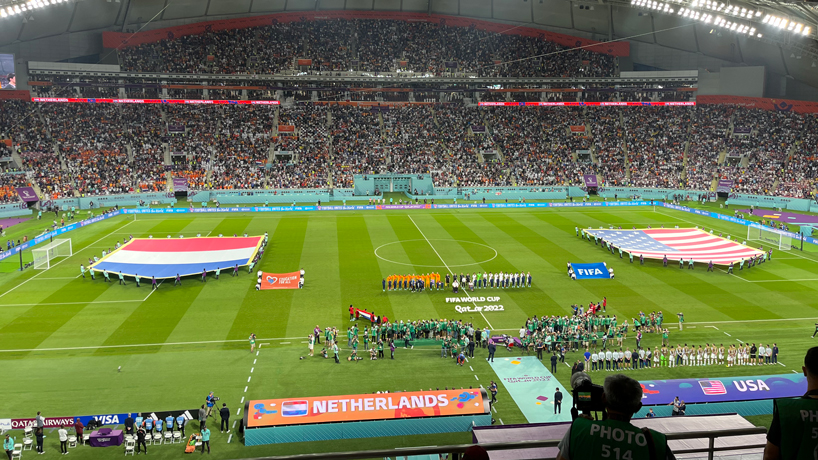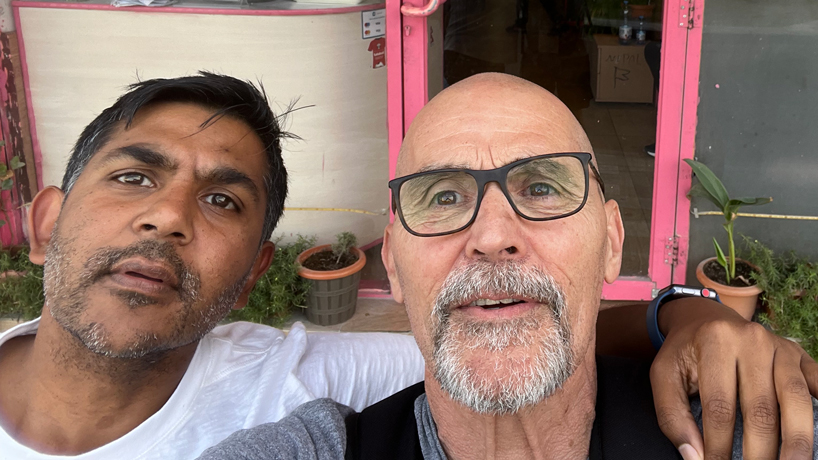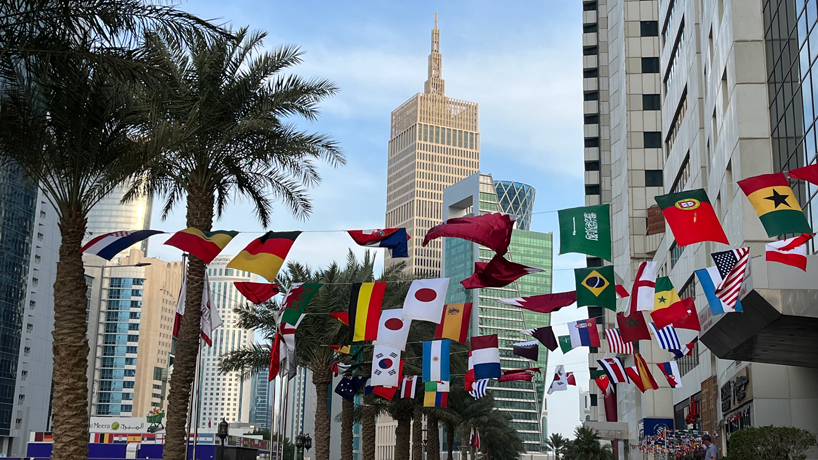
Players from the Netherlands and the United States line up on the field before the Dec. 3 World Cup soccer match at Khalifa International Stadium in Al Rayyan, Qatar. (Photos courtesy of Stephen Wade)
It’s believed that more than a billion people worldwide tuned in Dec. 18 to witness the final of the 2022 World Cup from Lusail Stadium in Qatar, and they were treated to one of the most riveting soccer matches in history.
Two of the sport’s biggest stars, Lionel Messi of Argentina and Kylian Mbappé of France, led their teams in a dramatic duel that went to extra time and ultimately a penalty kick shootout courtesy of Mbappe’s third goal in the 118th minute. But it was Messi – with two goals of his own – who got to hoist the trophy following his final World Cup match as Argentina emerged victorious.
Stephen Wade (right) takes a selfie with his friend and New York Times journalist Tariq Panja outside a Nepali restaurant in Doha, Qatar, during the World Cup.
But no matter how sensational the final match was, veteran Associated Press reporter Stephen Wade believed it still paled in comparison to another World Cup storyline, namely how the tournament came to be held in Qatar in the first place.
“The game stuff I don’t hang onto, but the politics of it and the money of it is more intrinsic, more interesting to me,” he said.
Wade, who graduated from the University of Missouri–St. Louis with a bachelor’s degree in political science in 1974 and earned a master’s degree four years later, has been covering international sports for the AP since 1991, and he’s come to specialize in reporting on the politics and business associated with the games.
He spent three weeks in Qatar covering his fifth World Cup, writing about at least half a dozen matches, including the United States’ 3-1 loss to the Netherlands in the round of 16, and even more stories surrounding the competition. He’s also reported on eight Olympics, often embedding himself in the host cities long before the eyes of the world are trained on them to document how the global spectacles take shape – including the consequences they can bring for the local community.
The circumstances in Qatar – a country the size of Connecticut with a population of only about 3 million people and no history of success in international soccer – offered plenty to pique Wade’s interest.
“This was clearly a giant political event,” he said. “It involved being in the Middle East, being in a country that spent $200 billion on the World Cup. It was a bid granted by FIFA in 2010 that was probably corrupted, probably bribed.”
Qatari citizens are some of the richest people, per capita, in the world, but they represent only about 10% of the country’s population. The country relies heavily on migrant labor with many workers coming from poorer countries in southern Asia, such as Bangladesh, India, Nepal and the Philippines.
They toil under slave-like conditions for meager wages, and reports said about 6,500 died since Qatar was awarded the World Cup – many while being forced to work in extreme heat to build the infrastructure, including seven new stadiums, for the tournament.
The World Cup also brought with it scrutiny of Qatar’s treatment of women and members of the LGBTQ+ community.
“There are a lot of people now writing about this in a more serious manner, looking at the politics, the business, the culture of it,” Wade said. “I think people’s awareness has been raised by the journalists who cover it, and then consequently, the journalists who cover it feel more empowered to write about the other aspects of it.
“These are much, much bigger than sports events. Nobody spends $200 billion on a sporting event. I just finished the Tokyo Olympics, and Japan spent officially $13 billion – probably twice that much. Nobody spends that kind of money if they think it’s just a sports event. These are a chance for a country like Qatar or Japan to put themselves on the world stage, to show the world who they are.”
Wade is grateful for the opportunities he’s had to chronicle events such as those, the 2008 Games in Beijing or the 2016 Games in Rio de Janiero.
He can still, more than four decades later, look back to his time at UMSL for helping put him on the path to get there.
“The university is a game-changer for a lot of kids,” he said. “It was for me.”
Wade was a first-generation college student when he started at the university, and he said he was far from a model student when he worked toward his bachelor’s degree. But he remembers faculty members Terry Jones, Lyman Sargent and Gene Meehan making indelible marks on his life.
Jones looked beyond his academic struggles as an undergraduate and helped him get into the master’s program, later serving as Wade’s advisor for his master’s thesis.
Sargent and Meehan helped challenged him to think differently and reason through complex topics.
“I remember I wrote a paper for Gene Meehan, and I went into his office, and the thing was full of red ink,” Wade said. “I said, ‘Dr. Meehan, I know how to write.’ He said, ‘Well, your problem is you don’t know how to think. First, you’ve got to learn to think and then get the ideas clearly on paper.’”
Wade enjoyed his time in the political science department enough that he once considered pursuing a PhD, but he got an opportunity to work in the sports department at the St. Louis Post-Dispatch as he was completing his master’s and couldn’t pass it up.
“I didn’t necessarily want to be a sports writer, but it was pretty cool getting a job at my hometown newspaper and seeing that byline,” he said.
He spent six years at the Post-Dispatch, primarily covering prep sports, beginning in the paper’s bureau in St. Charles and later moving to the main office.
Wade had an itch to see more of the world. He’d visited Costa Rica a couple summers earlier and learned some Spanish, so in 1984, he made the decision to leave the paper and St. Louis and moved to Madrid.
His first job abroad was working for the Spanish news agency EFE, which was then starting an English language service.
“Anybody who goes abroad, you often think you’re going to go abroad for six months, a year, and the first thing you know, it’s five years,” Wade said.
EFE’s office was located in the same building as The Associated Press bureau, and he got to know the chief. In 1991, she wound up hiring him to work at the AP.
He couldn’t have imagined all the places his career would take him since – a decade based in London, as well as time in Mexico City, Beijing, Buenos Aires, Rio and, for the past five years, Tokyo.
“Stuff just kind of falls in place, and then that becomes your life, your job,” he said. “All by serendipity really, just happenstance.”
Wade returned to Tokyo from Qatar exhausted after the World Cup and got a much-needed holiday around Christmas to recharge.
The next Olympics are in 2024 in Paris, which Wade expects to cover. But there are many smaller events in 2023 to keep an eye on: the World Baseball Classic with Japan hosting some games and Los Angeles Angels star pitcher and hitter Shohei Ohtani playing; the world swimming championships this summer in Fukuoka, Japan; and Formula One races in Japan and in China – if China reinstates its COVID-canceled race in Shanghai.
And there are continual follow-up stories on the corruption surrounding the one-year delayed 2020 Tokyo Olympics.
Even after decades of writing and reporting, Wade said he can’t imagine having a more compelling job.
“It’s sort of hard to give it up,” he said. “Sportswriters, or people who have jobs like I do, complain a lot, but when you step back, you say, ‘Man, if I walked away from this, in five seconds there would be 5,000 people – most of them better than me – who would love to try the job.’”
















